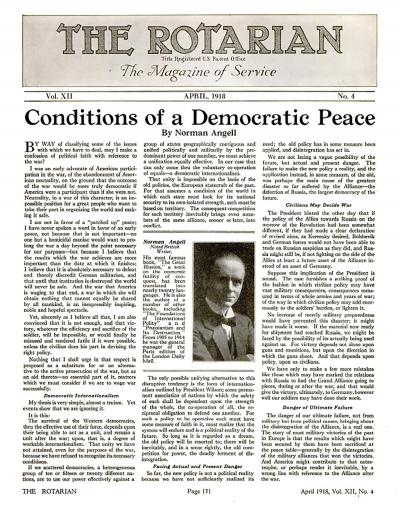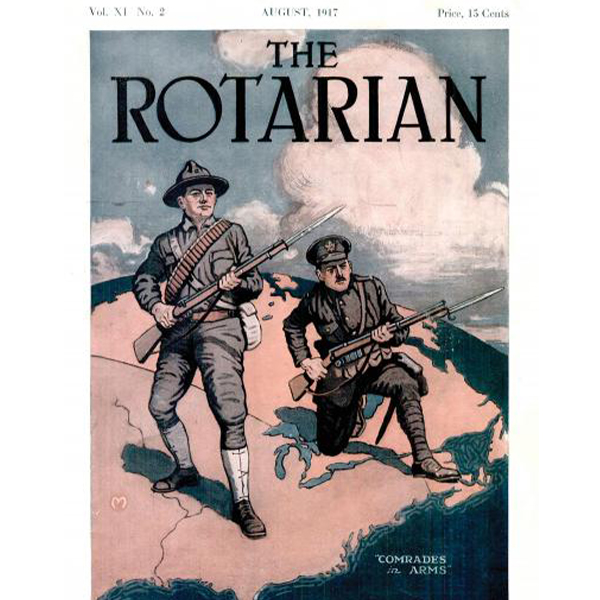The first four Rotarians: Gustavus Loehr, Silvester Schiele, Hiram Shorey, and Paul P. Harris, circa 1905-1912.

The first four Rotarians: Gustavus Loehr, Silvester Schiele, Hiram Shorey, and Paul P. Harris, circa 1905-1912.

Rotary founder Paul P. Harris, circa 1915
Rotary began as an idea over 100 years ago. Today, Rotary flourishes worldwide with 1.2 million members in more than 200 countries and geographical areas.
The world’s first service club, the Rotary Club of Chicago, was formed on 23 February 1905 by Paul Harris, an attorney who wished to capture in a professional club the same friendly spirit he had felt in the small towns of his youth.
The Rotary name derived from the early practice of rotating meetings among members’ offices.
Rotary’s popularity spread, and within a decade, clubs were chartered from San Francisco to New York to Winnipeg, Canada. By 1921, Rotary clubs had been formed on six continents. The organization adopted the Rotary International name a year later.
As Rotary grew, its mission expanded beyond serving club members’ professional and social interests. Rotarians began pooling their resources and contributing their talents to help serve communities in need. The organization’s dedication to this ideal is best expressed in its motto:

Service Above Self
By 1925, Rotary had grown to 200 clubs with more than 20,000 members. The organization’s distinguished reputation attracted presidents, prime ministers, and a host of other luminaries to its ranks: among them author Thomas Mann, diplomat Carlos P. Romulo, humanitarian Albert Schweitzer, and composer Jean Sibelius.
In 1932, Rotarian Herbert J. Taylor created The Four-Way Test, a code of ethics adopted by Rotary 11 years later. The test has been translated into more than 100 languages.
Is it the TRUTH?
Is it FAIR to all concerned?
Will it build GOODWILL and BETTER FRIENDSHIPS?
Will it be BENEFICIAL to all concerned?
During World War II, many clubs were forced to disband, while others stepped up their service efforts to provide emergency relief to victims of the war. In 1942, looking ahead to the post-war era, Rotarians called for a conference to promote international educational and cultural exchanges. This event inspired the founding of UNESCO.
In 1945, 49 Rotary club members served in 29 delegations to the UN Charter Conference. Rotary still actively participates in UN conferences by sending observers to major meetings and covering the United Nations in its publications.
“Few there are who do not recognize the good work which is done by Rotary clubs throughout the free world,” former Prime Minister Winston Churchill of Great Britain once declared.

As it approached the 21st century, Rotary worked to meet society’s changing needs, expanding its service efforts to address such pressing issues as environmental degradation, illiteracy, world hunger, and children at risk.
In 1989, the organization voted to admit women into clubs worldwide and now claims more than 145,000 female members in its ranks.
After the collapse of the Berlin Wall and the dissolution of the Soviet Union, Rotary clubs were formed or re-established throughout Central and Eastern Europe.
The first Russian Rotary club was chartered in 1990, and the organization underwent a growth spurt for the next several years.
Today, 1.2 million Rotarians belong to over 32,000 Rotary clubs in more than 200 countries and geographical areas. Rotary celebrated its centenary anniversary in 2005 and marked that with publication of a commemorative book, “A Century of Service – The Story of Rotary International”.
Our former member of Rotary Club Bangkok South, Rtn Gary White, was one of several Rotarians worldwide to receive a special leather-bound copy of the book for creating its name.
